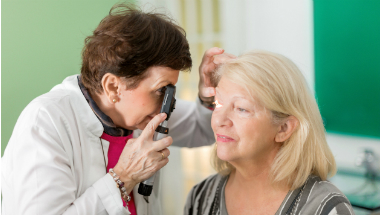Information for the public
Age-related macular degeneration: the care you should expect
Age-related macular degeneration is a painless eye condition that causes people to lose vision in the centre of their eye (affecting what you see looking straight ahead). It’s most common in people over 65 and usually happens in both eyes. Despite being a leading cause of vision loss, macular degeneration is a little known condition and diagnosis can often be a shock. Over time loss of central vision can make everyday life difficult, but early treatment can slow or prevent more loss and help people get the best from their vision.
We want this guideline to make a difference to people with macular degeneration by making sure:
- it is confirmed quickly and accurately so that people with types of macular degeneration that worsen quickly can be referred immediately
- all professionals talking to people about macular degeneration describe its different types and stages in the same way
- people who are offered eye injections are given information about what they involve, who will give them and how many they will need
- people understand the changes they can make to their diet and lifestyle to help slow the condition, and how to monitor their vision.
Making decisions together
Decisions about treatment and care are best when they are made together. Your health professionals should give you clear information, talk with you about your options and listen carefully to your views and concerns.
To help you make decisions, think about:
- How will macular degeneration and its treatment affect your day to day life?
- What are you most worried about – are there risks or downsides to different treatments that worry you more than others?
- What happens if you don’t want to have treatment?
- What changes you could make to your lifestyle to help slow your vision loss.
If you can’t understand the information you are given, tell your health professional.
Read more about making decisions about your care.
In the news
Read NICE news about how this guideline will help.
Opportunity to improve care for people with suspected late stage macular degeneration, says NICE

Where can I find out more?
NHS Choices has more information about macular degeneration.
The organisations below can give you more advice and support.
- Macular Society, 0300 3030 111
- RNIB, 0303 123 9999
- Look after your eyes (information for patients from the College of Optometrists)
NICE is not responsible for the content of these websites.
We wrote this guideline with people who have been affected by age-related macular degeneration and staff who treat and support them. All the decisions are based on the best research available.
ISBN: 978-1-4731-2788-3
Additional resources
This page was last updated: